
The Bible is overflowing with references to wine. Jesus makes wine out of water, and Noah gets drunk on wine after the infamous flood. In Ecclesiastes, wine is praised and in Proverbs, it is condemned. But what kind of wine were they drinking? Pinot? Cabernet sauvignon? A nice tender rosé? Nope, more likely the wines of Biblical times were made from one of 20 types of grapes indigenous to the West Bank, the area between Bethlehem (where Jesus was born) and Jerusalem (where he died).
In Israel and the West Bank, a growing number of wineries are reportedly working to create a wine that is close to what Jesus and his contemporaries drank thousands of years ago. “People are very enthusiastic about drinking a wine that King David had on his table, or for the same matter, Jesus or any other biblical figure,” said Eliyashiv Drori, who opened a boutique winery in a West Bank settlement. “They all grew here, they all lived here, and they all ate and drank wine here.”
To determine the types of grapes that would have been turned into wine back then, researchers examined preserved grape seeds found in archaeological digs. According to Drori, a wine researcher at Ariel University in the West Bank, people in Biblical times enjoyed a variety of wines—red and white, dry and sweet.
Through his research, Drori identified 120 varieties of grapes indigenous to the region, of which about 20 could be made into wine, including dabouki grapes. “For me, reconnecting to that is actually reconnecting to our roots, to our history, to the way of life of our ancestors,” he said. “That’s a big thing for me.”
In 2008, the Cremisan Winery in the West Bank became the first winery to return to making wine from dabouki grapes. Winemakers hope the uniqueness of the dabouki wine, as well as its historical significance, will help it grow in popularity. “To stay strong in the market, you need unique wines such as these,” said Ziad Bitar, sales manager for Cremisan. “We are talking about grapes that were here for thousands of years. We weren’t here, but we can imagine that they drank this type of wine.”
